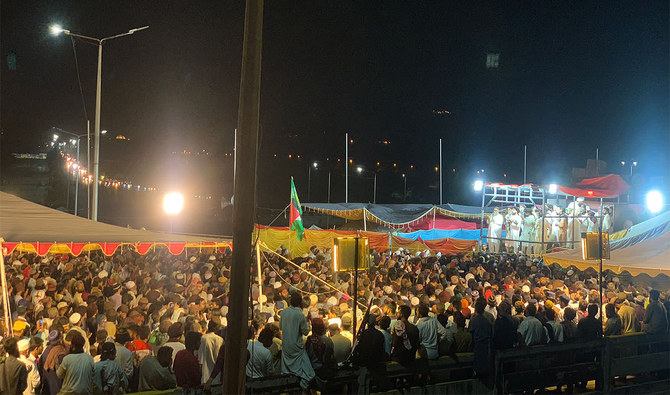ISLAMABAD: A pro-Palestine sit-in by Tehreek-e-Labbaik Pakistan (TLP) religious party entered its seventh day on Friday, with the party saying that it was in talks with the government regarding its demands.
The TLP has asked the government to officially boycott Israeli products and send food and medical aid to Palestinians suffering Israel’s relentless military campaign in Gaza. They have also called on Pakistan’s government to declare Israeli Prime Minister Benjamin Netanyahu a “terrorist.”
The demands were laid after TLP supporters, led by its young leader Saad Rizvi, rallied from Liaquat Bagh in Rawalpindi to Faizabad Interchange that connects it with Islamabad last Saturday before deciding to set up a protest camp there. Known for its hard-line stance on blasphemy laws, the party has previously staged sit-ins at the key interchange, significantly disrupting traffic.
The TLP said several of its members have been part of negotiations with a government team, which comprises Information Minister Ataullah Tarar, Adviser to PM on Political Affairs Rana Sanaullah, Islamabad inspector-general and deputy inspector-general.
“TLP negotiations with the federal government are still ongoing,” the party said in a statement on Thursday night.
Israel’s war on Gaza has so far claimed at least 39,000 lives, many of them women and children. The casualties have sparked anger and protests worldwide, including in Pakistan, where the country’s civil society and political factions have consistently led pro-Palestine rallies.
Pakistan does not recognize the state of Israel and calls for an independent Palestinian state based on “internationally agreed parameters.” Since the beginning of Israel’s war in October 2023, the South Asian country has dispatched several aid consignments, repeatedly raised the issue at various forums and demanded the world stop Israeli military actions in the Palestinian territory.
The large number of protesters at the Faizabad Interchange have effectively blocked the Islamabad Expressway, causing difficulty for commuters and creating gridlocks in the area.
Earlier, Sajjad Saifi, a member of the TLP’s consultative council, told Arab News that over 50,000 of their supporters, led by party chief Rizvi, were camped at the Faizabad Interchange.
“We will continue our dharna [sit-in] till all three of our demands are fully met,” he said.
Asked why the party decided to stage a sit-in protest nine months into the war, Saifi said the TLP had mobilized the public since October last year through rallies across Pakistan.
“Tens of thousands of our supporters have been waiting for the leadership’s call to join the dharna in Islamabad,” he said. “We are doing it for a cause, for the people of Palestine. We don’t have any political agenda to achieve through this dharna.”
Asked about the protest and the inconvenience being caused to the public, Information Minister Tarar said on Thursday: “Don’t worry, we are on it.”
















